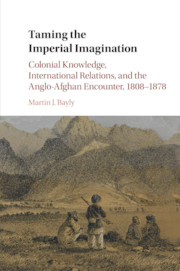Crossref Citations
This Book has been
cited by the following publications. This list is generated based on data provided by Crossref.
Bayly, Martin J.
2015.
Imperial ontological (in)security: ‘Buffer states’, International Relations and the case of Anglo-Afghan relations, 1808–1878.
European Journal of International Relations,
Vol. 21,
Issue. 4,
p.
816.
Manchanda, Nivi
2017.
Rendering Afghanistan legible: Borders, frontiers and the ‘state’ of Afghanistan.
Politics,
Vol. 37,
Issue. 4,
p.
386.
Fuoli, Francesca
2018.
Incorporating north-western Afghanistan into the British empire: experiments in indirect rule through the making of an imperial frontier, 1884–87.
Afghanistan,
Vol. 1,
Issue. 1,
p.
4.
CONDOS, MARK
and
RAND, GAVIN
2018.
COERCION AND CONCILIATION AT THE EDGE OF EMPIRE: STATE-BUILDING AND ITS LIMITS IN WAZIRISTAN, 1849–1914.
The Historical Journal,
Vol. 61,
Issue. 3,
p.
695.
Hariri, Aula
2019.
State formation as an outcome of the imperial encounter: the case of Iraq.
Review of International Studies,
Vol. 45,
Issue. 5,
p.
848.
WILKS, ANN
2019.
The 1921 Anglo-Afghan Treaty: How Britain's ‘man on the spot’ shaped this agreement.
Journal of the Royal Asiatic Society,
Vol. 29,
Issue. 1,
p.
75.
Goettlich, Kerry
2019.
The rise of linear borders in world politics.
European Journal of International Relations,
Vol. 25,
Issue. 1,
p.
203.
Lally, Jagjeet
2020.
Landscape, race, and power on the Indo-Afghan frontier, c.1840-c.1880.
South Asian History and Culture,
Vol. 11,
Issue. 3,
p.
277.
Warner, H William
2020.
The Kabuliwalas: Afghan moneylending and the credit cosmopolis of British India, c. 1880–1947.
The Indian Economic & Social History Review,
Vol. 57,
Issue. 2,
p.
171.
Manchanda, Nivi
2020.
Imagining Afghanistan.
O'Sullivan, Michael
2021.
Vernacular Capitalism and Intellectual History in a Gujarati Account of China, 1860–68.
The Journal of Asian Studies,
Vol. 80,
Issue. 2,
p.
267.
Sherman, William E. B.
2021.
Romance on the Afghan Frontier: Desire in the Literature of the Church Missionary Society of Peshawar.
The Journal of Imperial and Commonwealth History,
Vol. 49,
Issue. 6,
p.
1021.
Bayly, Martin J.
2021.
Frontiers: real and imagined.
Critical Asian Studies,
Vol. 53,
Issue. 1,
p.
165.
Sherman, William E. B.
2022.
In the Garden of Language: Religion, Vernacularization, and the Pashto Poetry of Arzānī in the Sixteenth and Seventeenth Centuries.
Afghanistan,
Vol. 5,
Issue. 1,
p.
122.
Kaul, Nitasha
2022.
Friendship and International Relations in the Himalayas: Bhutan, Britain, and the 1910 Treaty of Punakha.
Itinerario,
Vol. 46,
Issue. 3,
p.
417.
Mechkarini, Sara
Siân Rutherford, Dega
and
Sèbe, Berny
2023.
Unmasking the Colonial Past: Memory, Narrative, and Legacy.
The Journal of Imperial and Commonwealth History,
Vol. 51,
Issue. 5,
p.
825.
Amir, Fahim
2023.
Drones, Bodies, Necropolitics.
Filozofski vestnik,
Vol. 44,
Issue. 2,
De Capitani, Lucio
2023.
Ethnographic Narratives as World Literature.
p.
57.
Sabaratnam, Meera
2023.
Bring up the bodies: international order, empire, and re-thinking the Great War (1914–1918) from below.
European Journal of International Relations,
Vol. 29,
Issue. 3,
p.
553.
Çapan, Zeynep Gülşah
and
dos Reis, Filipe
2024.
Creating colonisable land: Cartography, ‘blank spaces’, and imaginaries of empire in nineteenth-century Germany.
Review of International Studies,
Vol. 50,
Issue. 1,
p.
146.





